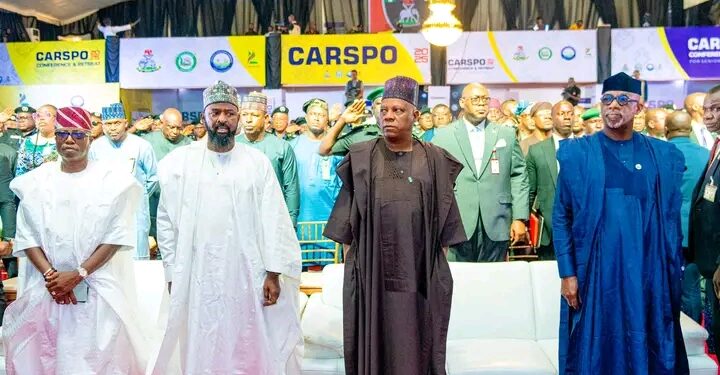President Bola Tinubu has assured Nigerians that his administration has taken significant steps to strengthen the nation’s security agencies, ensuring they are well-equipped to tackle emerging security challenges and safeguard lives and property.
Speaking at the 5th edition of the Conference and Retreat for Senior Police Officers (CARSPO) at the H3 Event Centre, Oke-Mosan, Abeokuta, Ogun State, Tinubu, who was represented by Vice President Kashim Shettima, emphasized that security remains a top priority for his government.
“We understand that a secure nation is the foundation for socio-economic development. This is why we are committed to strengthening the operational capabilities of our security agencies by providing modern equipment and necessary resources to combat crime effectively,” he stated.
The President highlighted the need for collective responsibility in maintaining internal security, urging citizens to collaborate with law enforcement agencies.
“Security is a shared responsibility. While the Nigeria Police Force has a constitutional mandate to protect lives and property, public cooperation is essential. No matter how well-funded or equipped, policing efforts cannot succeed without the active support and trust of the people,” he added.
Reaffirming his administration’s commitment to police reforms, Tinubu disclosed that plans are underway to bridge critical gaps in security infrastructure, personnel recruitment, and training.
“Our government is implementing a comprehensive and sustainable security program that includes the renovation of police barracks, improved mobility for officers, and upgrading essential combat and protective gear,” he noted.
On welfare, Tinubu reiterated that the proposed new minimum wage is part of broader efforts to improve the living conditions of Nigerian workers, including security personnel.
“We remain committed to working with the police leadership to provide financial incentives that will boost the morale of officers and other security personnel, ensuring they perform at their best,” he assured.
The President also spoke on economic reforms, saying, “We are implementing policies to stabilize the foreign exchange market, remove financial leakages by eliminating fuel and electricity subsidies, and invest in infrastructure through Public-Private Partnerships to drive economic growth.”
Governor Abiodun: Public Trust Key to Effective Policing
Ogun State Governor, Prince Dapo Abiodun, in his remarks, described security as the backbone of a thriving society, emphasizing that effective policing must be rooted in community engagement and trust.
“Inclusive policing is about understanding the needs of the people. A security system that actively engages with local communities, upholds human rights, and prioritizes transparency is essential in combating crime and maintaining peace,” he stated.
The Governor noted that his administration has consistently supported security agencies through strategic investments in modern infrastructure and technology. However, he pointed out that a major challenge in security management is the lack of public trust.
“We must build a policing system where every Nigerian, regardless of background, sees law enforcement officers as protectors, not oppressors. Law enforcement agents must uphold the highest standards of professionalism and accountability,” Abiodun said.
As part of efforts to enhance policing, the Governor announced plans to equip security agencies in the state with electric-powered motorcycles and advanced surveillance drones capable of facial recognition up to 8,000 meters.
“As crime becomes more sophisticated, our security forces must evolve. We are integrating technology-driven solutions such as surveillance drones, digital forensic tools for cybercrime tracking, and data-driven crime mapping to predict and prevent criminal activities. Artificial intelligence must also be embraced to ensure proactive policing,” he added.
IGP Egbetokun: Intelligence-Led Policing Remains a Priority
Inspector General of Police, Kayode Egbetokun, emphasized that Nigeria’s evolving security landscape requires intelligence-led policing to address threats such as violent crime, cyber-related offenses, terrorism, and transnational organized crimes.
“Our approach must be proactive. The reorganization of the Force Criminal Investigation Department (FCID) and other specialized units remains a priority to ensure that our detectives operate in line with globally accepted best practices,” he stated.
The IGP further disclosed that all police commands and formations have been directed to implement a comprehensive action plan aimed at reducing crime rates by 50% in 2025.
“We are committed to strengthening strategic partnerships with both domestic and international security agencies while also enhancing community engagement to foster public trust and encourage active citizen participation in policing,” he added.
Egbetokun reaffirmed that modern policing requires innovation and adaptability, stressing that law enforcement must stay ahead of criminal networks through continuous training, technological adoption, and improved intelligence gathering.

























